NHS Health Check: How Germany's healthcare system works
- Published
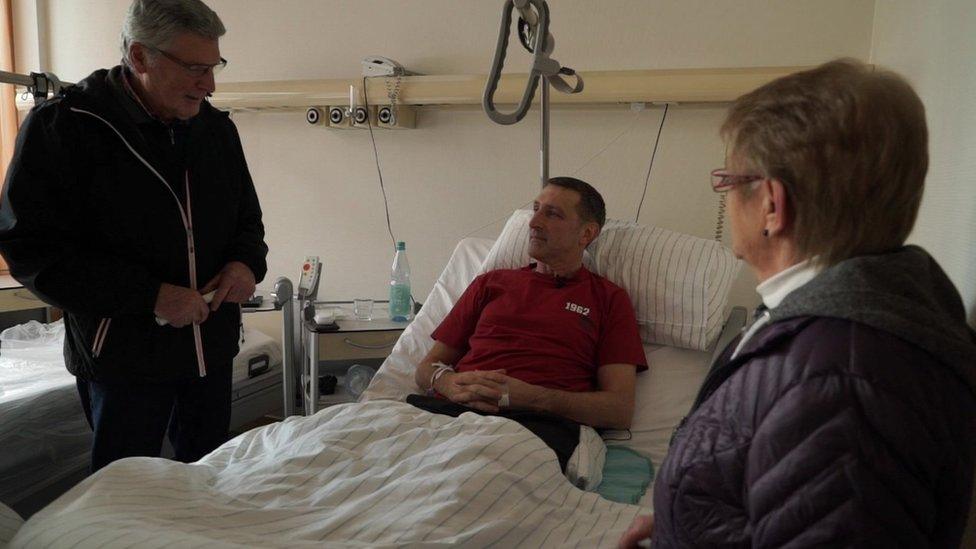
Patient Georg Thoma after his hip operation
The day after his hip replacement, Georg Thoma was cheerfully sitting up in bed.
Like most Germans, the businessman pays into compulsory health insurance.
He contributes 7% of his salary before tax and his employers match that amount.
In return, patients get access to care which is so rapid that national waiting data is not collected.
"The doctor said to me that I have to decide when I get the operation. Normally it takes three or four weeks."
Georg travels for work to the UK and tells me he was astonished to hear that patients can sometimes wait months for a similar routine operation.
Germany's spending on health care is relatively high, just over 11% of its wealth, compared to 9.8% in the UK and it has more doctors and hospital beds per patient than the UK.
Georg's operation was carried out in an 80-bed hospital in one of the Black Forest towns in the south-west region Baden Wurttemberg.
But even in Germany's well-funded system, the financial viability of a hospital this small is not guaranteed.
Prevention a priority
A group of doctors in this area is trying to manage costs in an experiment that has attracted interest from the UK.
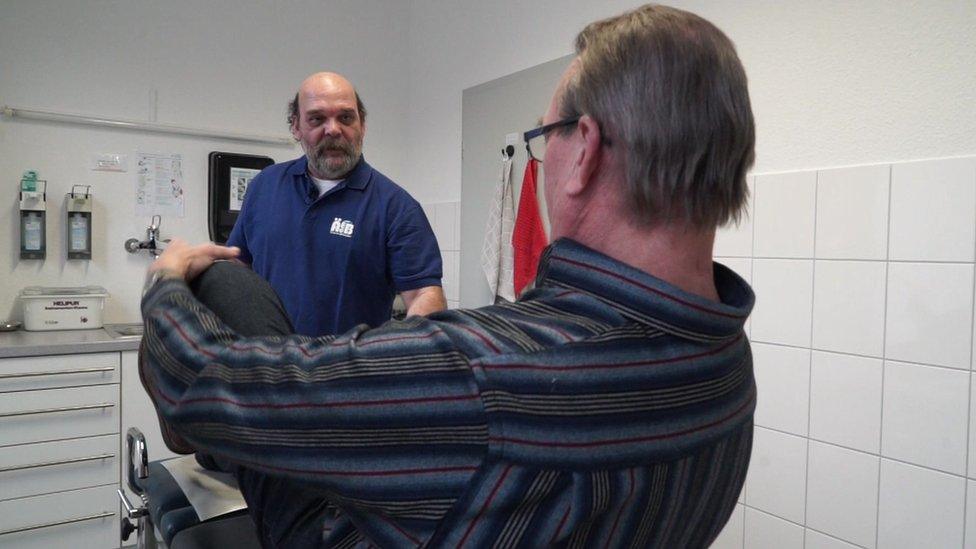
Dr Martin Wetzel is focusing on prevention work
Martin Wetzel, a GP for 25 years, explains they have done a deal with big insurance funds to make prevention a priority.
"I have more time - and it needs more time to explain to patients what I'm doing and why. So my consultations changed from an eye wink to an average of 15 minutes," he says.
During that time patients might be offered a range of interventions to improve their health provided locally, which frees up time for the GP.
These include subsidised gym sessions, access to different sports and nutrition advice as well as screening programmes to reduce loneliness as well as increasing healthiness.
It is being run by a company called Gesundes Kinzigtal in which the doctors are majority shareholders.
Already a couple of years into their 10-year project, they say healthcare is costing 6% less than you would expect for the population.
They are trying to improve data sharing and believe hospital treatment can be reduced further.
Much of the vision comes from its chief executive Helmut Hildebrandt, a pharmacist and public health expert.
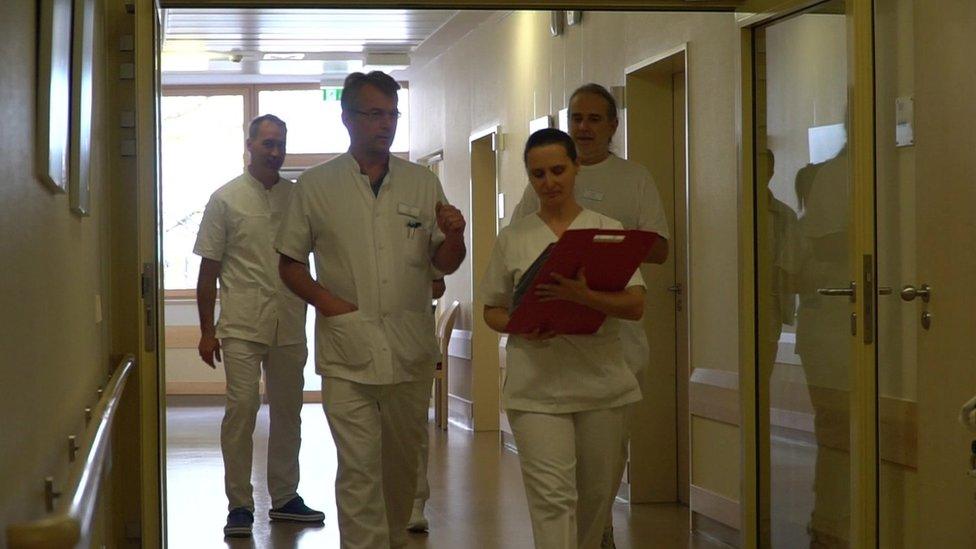
Hospital doctors on a ward round
He says the health insurance funds have tended to concentrate on short-term cost control measures, rather than improving the health of their patients.
"At the moment the economy in Germany runs so well they don't have a problem. But in the long run every politician or administrator knows in the next 10 or 20 years the system will run into a crisis."
He fears that could undermine the commitment to the health insurance covering most Germans, with a risk of richer people opting out of it.
More waste
What Gesundes Kinzigtal is trying to do is similar to some integrated care projects in the NHS.
There is more money in the German system, but arguably more waste too.
The Caesarean rate is higher, so is the use of MRI for diagnosis and the length of hospital stay.
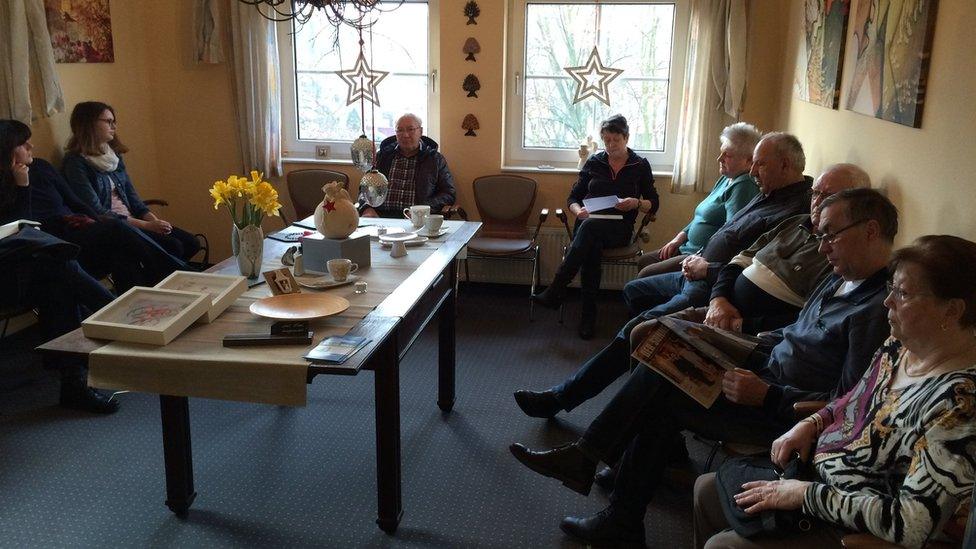
Patients waiting to see a GP in Thuringia
And in many ways there has been little incentive for change in a system where doctors still have a high degree of influence and life expectancy in Germany is not higher than the UK.
Bernadette Klapper heads the health section of the Robert Bosch Foundation, which funds social policy innovation.
"I think we should get more for the money we spend inside healthcare. While we see other countries spending less, but having the same results as us, there's something wrong."
Ageing population
Germany is ageing very rapidly, only just behind Japan in forecast for its population profile.
But the health system is changing slowly and the Bosch foundation is trying to encourage more small health centres.
Many doctors in Germany set up in practice on their own, as GPs or out-of-hospital specialists, but as cities are more popular that leaves rural areas with a shortage.
Travel east to the wide open rolling countryside of Thuringia and you get a glimpse of the challenge.
Five years ago they were 200 GPs short of what was needed in this region.
It has taken grants, and offers of help with housing and arranging childcare, to reduce that to 60.
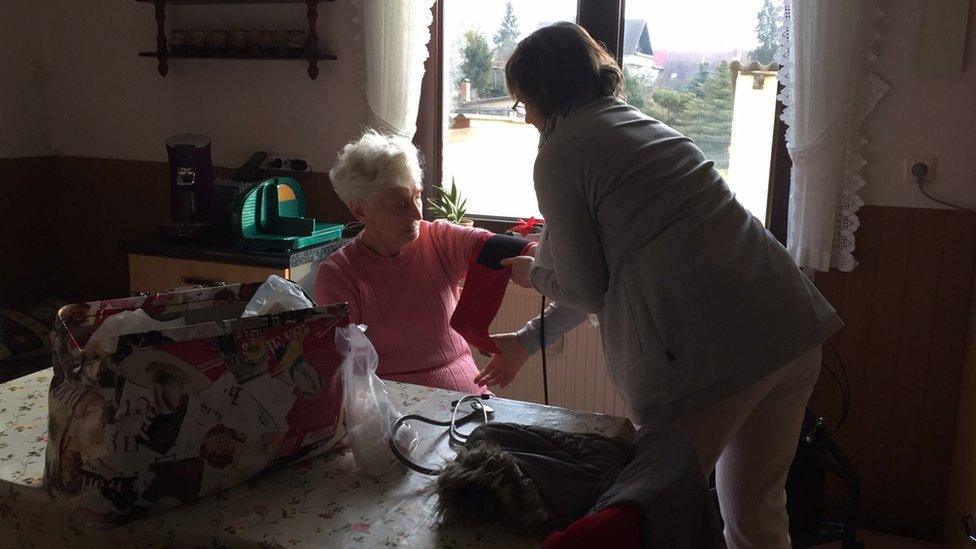
A community nurse treats a patient
Annette Rommel is head of the doctors' association in the village of Mechterstadt and says: "A few years ago we arranged for specially-trained nurses to make home visits and for more teamwork with nurses and doctors together."
It is similar to the way many community nurses work in the UK, but in Germany this is a recent development.
Nurses have a much more restricted role.
On a visit I saw a nurse and a carer, who is paid for out of the long-term care insurance that Germany introduced 20 years ago, check up on an elderly couple.
It has reduced the amount families have to pay, although social care can still be a financial worry.
There is enough money in the German system to make trying new approaches to healthcare a little easier.
Most patients feel they can see a doctor easily, so for example the number of visits to the equivalent of A&E is very low compared to the UK.
While out of hours care has been reorganised, GPs and other out of hospital doctors are often still involved in helping provide cover on a rotation.
None of this removes the long-term worry about whether providing such rapid and easy access to care is affordable in the long term.
A debate that German politicians are unlikely to begin publicly in this election year or any time soon.

Different systems
Germany
Nine out of 10 Germans pay 7% of their pre-tax salary into statutory health insurance, matched by their employers
Pensioners and the short-term unemployed also contribute, children are covered by their parents and the federal government compensates for the rest
The highest earners, civil servants and the self-employed have private insurance but use it to access the same doctors and hospitals
There are more hospital beds, and doctors per patients than in the UK, and you can go directly to see a specialist based in the community
Germans also pay a smaller amount into long-term care insurance, but families have to pay a significant amount for social care
UK
In every part of the UK, the NHS is paid for out of general taxation and the proportion of public money allocated to it is a matter of policy for each of the devolved governments
Patients have direct access to a GP, but have to be referred to see a specialist, who mainly work in hospitals, with the exception of some specialities like psychiatry
There are waiting targets, but for some routine operations patients can face waits of many months
Social care is means tested and access is increasingly restricted to those with the highest level of need. There is no insurance to cover for old age care

The lessons for the UK are that money on its own is not the only solution, although it does ease pressure in the system considerably.
Finding better co-ordinated ways of looking after patients, often elderly, with the highest health needs is a priority.
And in Germany, despite the long-term care insurance, families still have to contribute a significant amount to looking after older people.
However, there is a mechanism for sustainable funding for social care that is very different from the significant reductions in care budgets seen in the UK.

NHS Health Check

A week of coverage by BBC News examining the state of the NHS across the UK as it comes under intense pressure during its busiest time of the year.
- Published7 February 2017

- Published5 February 2017

- Published5 February 2017

- Published21 February 2017

- Published5 February 2017
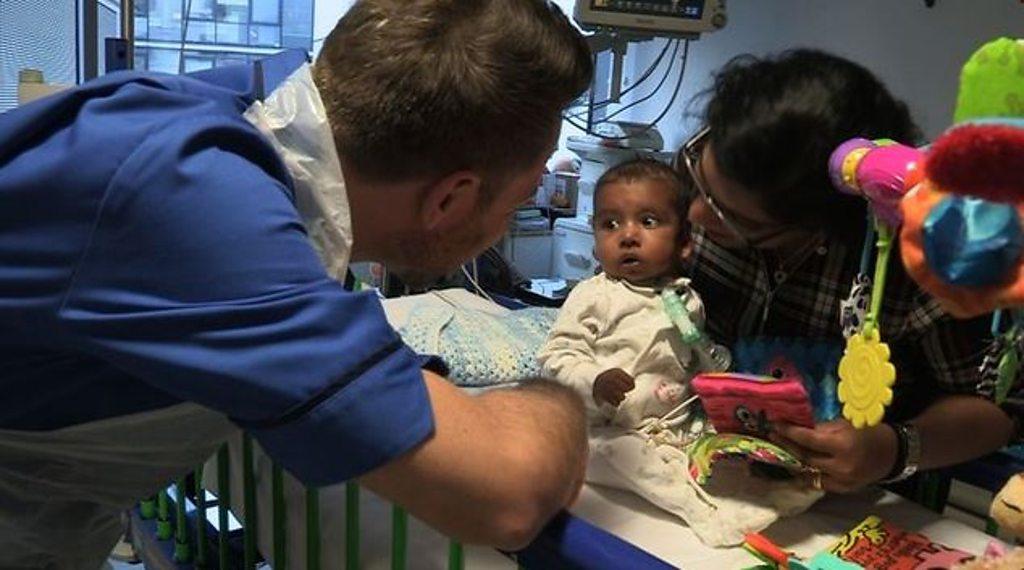
- Published5 February 2017
